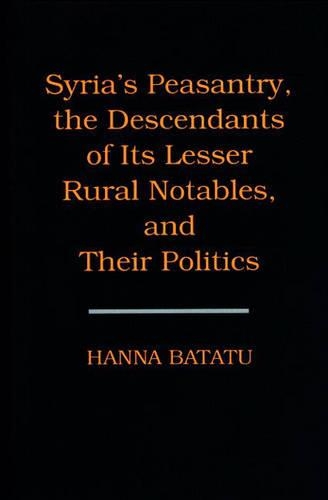
Syria's Peasantry, the Descendants of Its Lesser Rural Notables, and Their Politics
(Hardback)
Publishing Details
Syria's Peasantry, the Descendants of Its Lesser Rural Notables, and Their Politics
By (Author) Hanna Batatu
Princeton University Press
Princeton University Press
28th September 1999
United States
Classifications
Professional and Scholarly
Non Fiction
Social and cultural history
Rural communities / rural life
956.9104
Physical Properties
Hardback
432
Width 152mm, Height 235mm
482g
Description
This text presents a comprehensive analysis of the social, economic and political evolution of Syria's peasantry, the segment of society from which contemporary holders of political power stem. It focuses on mainly the 20th century and, in particular, the Ba'th movement, the structures of power after the military coup d'etat 1963, and the era of Hafiz al-Asad, Syria's first ruler of peasant extraction. Without seeking to prove any single theory about Syrian life, Hanna Batatu offers a detailed account of how power is maintained. Batatu begins by examining social differences among Syria's peasants and the evolution of their mode of life and economic circumstances. He then scrutinizes the peasants' forms of consciousness, organization and behaviour in Ottoman and Mandate times and proir to the Ba'thists' rise to power. He explores the rural aspects of Ba'thism and shows that it was not a single force but plurality of interrelated groups, prominent among them the descendants of the lesser notables, with different socail goals and mental horizons. The book provides a perceptive account of President Asad, his personality and conduct, and the characteristics and power structures of his regime.
Reviews
"Batatu's thoroughly researched, objective study provides a sociological and anthropological approach to contemporary Syrian politics and is an excellent source of information on various and often conflicting components of Syrian society."--Choice
Author Bio
Hanna Batatu is Professor of Contemporary Arab Studies Emeritus at Georgetown University. In addition to his contributions to many books and scholarly journals, he is the author of the landmark work The Old Social Classes and the Revolutionary Movements of Iraq (Princeton).
